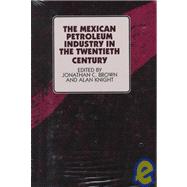Mexico's Petroleum Industry has come to symbolize the very sovereignty of the nation itself. Politicians criticize Pemex, the national oil company, at their peril, and President Salinas de Gortari has made clear that the free trade negotiations between Mexico and the United States will not affect Pemex's basic status as a public enterprise. How and why did the petroleum industry gain such prominence - and, some might say, immunity - within Mexico's political economy?
The Mexican Petroleum Industry in the Twentieth Century, edited by Jonathan C. Brown and Alan Knight, seeks to explain the impact of the oil sector on Mexico's economic, political, and social development. The book outlines how the foreign oil companies, beginning in the 1880s, converted Mexico from an importer of petroleum products to one of the world's foremost oil exporters - despite the upheaval of the Mexican Revolution. The state and the oil companies, however, increasingly clashed over taxation and ownership, and Mexican oil workers, drawing on their vigorous cultural traditions, organized to defend their collective interests in this new industrial setting.
The outcome of this complex set of relationships - President Cardenas' nationalization of the oil companies in 1938 - was a watershed in Mexican history and represented the first major oil nationalization undertaken by a Third World power. Several chapters in the book examine the complex web of domestic politics and international diplomacy that led to the creation of Pemex and analyze the role of the oil workers and national elites in this process. Pemex was born during a difficult period of international oil boycott, worker-state conflict, and technological deficiencies. Yet the national company survived. By the 1950s, Pemex had assumed the tasks, via the provision of cheap fuels, of underwriting Mexico's rapid industrial expansion. These were the years when the oil workers' union gained a reputation for both power and corruption.
The oil industry slipped into crisis in the early 1970s as Mexico, for the first time in fifty years, began to import petroleum. A conscious decision by the government to change the nation's energy policies contributed to the export boom of the late 1970s and, finally, to the large foreign debt and low oil prices of the 1980s. As the nation's oil industry' enters its second century of existence, Mexicans once again are reevaluating the proper relationship of state ownership and direction, foreign capital, and worker participation.
The Mexican Petroleum Industry in the Twentieth Century is a multinational effort - one author is Australian, two British, three North American, and five Mexican. Each contributing scholar has researched and written extensively about Mexico and its oil industry.








